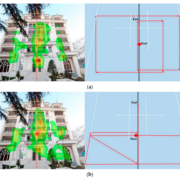The Role of Symmetry in the Aesthetics of Residential Building Façades Using Cognitive Science Methods
Symmetry is an important visual feature for humans and its application in architecture is completely evident. This paper aims to investigate the role of symmetry in the aesthetics judgment of residential building façades and study the pattern of eye movement based on the expertise of subjects in architecture. In order to implement this in the present paper, we have created images in two categories: symmetrical and asymmetrical façade images. The experiment design allows us to investigate the preference of subjects and their reaction time to decide about presented images as well as record their eye movements. It was inferred that the aesthetic experience of a building façade is influenced by the expertise of the subjects. There is a significant difference between experts and non-experts in all conditions, and symmetrical façades are in line with the taste of non-expert subjects. Moreover, the patterns of fixational eye movements indicate that the horizontal or vertical symmetry (mirror symmetry) has a profound influence on the observer’s attention, but there is a difference in the points watched and their fixation duration. Thus, although symmetry may attract the same attention during eye movements on façade images, it does not necessarily lead to the same preference between the expert and non-expert groups.




